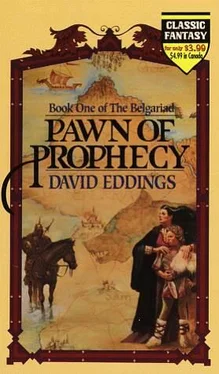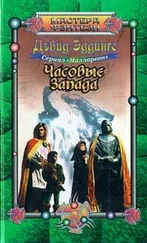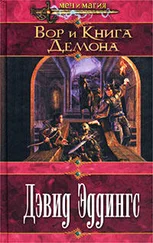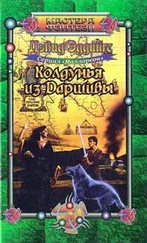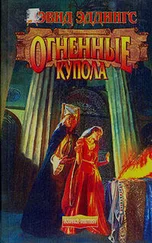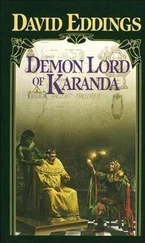David Eddings - Pawn of Prophecy
Здесь есть возможность читать онлайн «David Eddings - Pawn of Prophecy» весь текст электронной книги совершенно бесплатно (целиком полную версию без сокращений). В некоторых случаях можно слушать аудио, скачать через торрент в формате fb2 и присутствует краткое содержание. Жанр: Фэнтези, на английском языке. Описание произведения, (предисловие) а так же отзывы посетителей доступны на портале библиотеки ЛибКат.
- Название:Pawn of Prophecy
- Автор:
- Жанр:
- Год:неизвестен
- ISBN:нет данных
- Рейтинг книги:3 / 5. Голосов: 1
-
Избранное:Добавить в избранное
- Отзывы:
-
Ваша оценка:
- 60
- 1
- 2
- 3
- 4
- 5
Pawn of Prophecy: краткое содержание, описание и аннотация
Предлагаем к чтению аннотацию, описание, краткое содержание или предисловие (зависит от того, что написал сам автор книги «Pawn of Prophecy»). Если вы не нашли необходимую информацию о книге — напишите в комментариях, мы постараемся отыскать её.
Pawn of Prophecy — читать онлайн бесплатно полную книгу (весь текст) целиком
Ниже представлен текст книги, разбитый по страницам. Система сохранения места последней прочитанной страницы, позволяет с удобством читать онлайн бесплатно книгу «Pawn of Prophecy», без необходимости каждый раз заново искать на чём Вы остановились. Поставьте закладку, и сможете в любой момент перейти на страницу, на которой закончили чтение.
Интервал:
Закладка:
As he grew a bit older, it even became a game. Garion would watch until she seemed far too busy to notice him, and then, laughing, he would run on his sturdy little legs toward a door. But she would always catch him. And he would laugh and throw his arms around her neck and kiss her and then go back to watching for his next chance to run away again.
He was quite convinced in those early years that his Aunt Pol was quite the most important and beautiful woman in the world. For one thing, she was taller than the other women on Faldor’s farm—very nearly as tall as a man—and her face was always serious—even stern—except with him, of course. Her hair was long and very dark—almost black—all but one lock just above her left brow which was white as new snow. At night when she tucked him into the little bed close beside her own in their private room above the kitchen, he would reach out and touch that white lock; she would smile at him and touch his face with a soft hand. Then he would sleep, content in the knowledge that she was there, watching over him.
Faldor’s farm lay very nearly in the center of Sendaria, a misty kingdom bordered on the west by the Sea of the Winds and on the east by the Gulf of Cherek. Like all farmhouses in that particular time and place, Faldor’s farmstead was not one building or two, but rather was a solidly constructed complex of sheds and barns and hen roosts and dovecotes all facing inward upon a central yard with a stout gate at the front. Along the second story gallery were the rooms, some spacious, some quite tiny, in which lived the farmhands who tilled and planted and weeded the extensive fields beyond the walls. Faldor himself lived in quarters in the square tower above the central dining hall where his workers assembled three times a day—sometimes four during harvest time—to feast on the bounty of Aunt Pol’s kitchen.
All in all, it was quite a happy and harmonious place. Farmer Faldor was a good master. He was a tall, serious man with a long nose and an even longer jaw. Though he seldom laughed or even smiled, he was kindly to those who worked for him and seemed more intent on maintaining them all in health and well-being than extracting the last possible ounce of sweat from them. In many ways he was more like a father than a master to the sixty-odd people who lived on his freeholding. He ate with them—which was unusual, since many farmers in the district sought to hold themselves aloof from their workers—and his presence at the head of the central table in the dining hall exerted a restraining influence on some of the younger ones who tended sometimes to be boisterous. Farmer Faldor was a devout man, and he invariably invoked with simple eloquence the blessing of the Gods before each meal. The people of his farm, knowing this, filed with some decorum into the dining hall before each meal and sat in the semblance at least of piety before attacking the heaping platters and bowls of food that Aunt Pol and her helpers had placed before them.
Because of Faldor’s good heart—and the magic of Aunt Pol’s deft fingers—the farm was known throughout the district as the finest place to live and work for twenty leagues in any direction. Whole evenings were spent in the tavern in the nearby village of Upper Gralt in minute descriptions of the near-miraculous meals served regularly in Faldor’s dining hall. Less fortunate men who worked at other farms were frequently seen, after several pots of ale, to weep openly at descriptions of one of Aunt Pol’s roasted geese, and the fame of Faldor’s farm spread wide throughout the district.
The most important man on the farm, aside from Faldor, was Durnik the smith. As Garion grew older and was allowed to move out from under Aunt Pol’s watchful eye, he found his way inevitably to the smithy. The glowing iron that came from Durnik’s forge had an almost hypnotic attraction for him. Durnik was an ordinary-looking man with plain brown hair and a plain face, ruddy from the heat of his forge. He was neither tall nor short, nor was he thin or stout. He was sober and quiet, and like most men who follow his trade, he was enormously strong. He wore a rough leather jerkin and an apron of the same material. Both were spotted with burns from the sparks which flew from his forge. He also wore tight-fitting hose and soft leather boots as was the custom in that part of Sendaria. At first Durnik’s only words to Garion were warnings to keep his fingers away from the forge and the glowing metal which came from it. In time, however, he and the boy became friends, and he spoke more frequently.
"Always finish what you set your hand to," he would advise. "It’s bad for the iron if you set it aside and then take it back to the fire more than is needful."
"Why is that?" Garion would ask.
Durnik would shrug. "It just is."
"Always do the very best job you can," he said on another occasion as he put a last few finishing touches with a file on the metal parts of a wagon tongue he was repairing.
"But that piece goes underneath," Garion said. "No one will ever see it."
"But I know it’s there," Durnik said, still smoothing the metal. "If it isn’t done as well as I can do it, I’ll be ashamed every time I see this wagon go by—and I’ll see the wagon every day."
And so it went. Without even intending to, Durnik instructed the small boy in those solid Sendarian virtues of work, thrift, sobriety, good manners, and practicality which formed the backbone of the society.
At first Aunt Pol worried about Garion’s attraction to the smithy with its obvious dangers; but after watching from her kitchen door for a while, she realized that Durnik was almost as watchful of Garion’s safety as she was herself and she became less concerned.
"If the boy becomes pestersome, Goodman Durnik, send him away," she told the smith on one occasion when she had brought a large copper kettle to the smithy to be patched, "or tell me, and I’ll keep him closer to the kitchen."
"He’s no bother, Mistress Pol," Durnik said, smiling. "He’s a sensible boy and knows enough to keep out of the way."
"You’re too good-natured, friend Durnik," Aunt Pol said. "The boy is full of questions. Answer one and a dozen more pour out."
"That’s the way of boys," Durnik said, carefully pouring bubbling metal into the small clay ring he’d placed around the tiny hole in the bottom of the kettle. "I was question some myself when I was a boy. My father and old Barl, the smith who taught me, were patient enough to answer what they could. I’d repay them poorly if I didn’t have the same patience with Garion."
Garion, who was sitting nearby, had held his breath during this conversation. He knew that one wrong word on either side would have instantly banished him from the smithy. As Aunt Pol walked back across the hard-packed dirt of the yard toward her kitchen with the new-mended kettle, he noticed the way that Durnik watched her, and an idea began to form in his mind. It was a simple idea, and the beauty of it was that it provided something for everyone.
"Aunt Pol," he said that night, wincing as she washed one of his ears with a rough cloth.
"Yes?" she said, turning her attention to his neck.
"Why don’t you marry Durnik?"
She stopped washing. "What?" she asked.
"I think it would be an awfully good idea."
"Oh, do you?" Her voice had a slight edge to it, and Garion knew he was on dangerous ground.
"He likes you," he said defensively.
"And I suppose you’ve already discussed this with him?"
"No," he said. "I thought I’d talk to you about it first."
"At least that was a good idea."
"I can tell him about it tomorrow morning, if you’d like."
His head was turned around quite firmly by one ear. Aunt Pol, Garion felt, found his ears far too convenient.
Читать дальшеИнтервал:
Закладка:
Похожие книги на «Pawn of Prophecy»
Представляем Вашему вниманию похожие книги на «Pawn of Prophecy» списком для выбора. Мы отобрали схожую по названию и смыслу литературу в надежде предоставить читателям больше вариантов отыскать новые, интересные, ещё непрочитанные произведения.
Обсуждение, отзывы о книге «Pawn of Prophecy» и просто собственные мнения читателей. Оставьте ваши комментарии, напишите, что Вы думаете о произведении, его смысле или главных героях. Укажите что конкретно понравилось, а что нет, и почему Вы так считаете.
